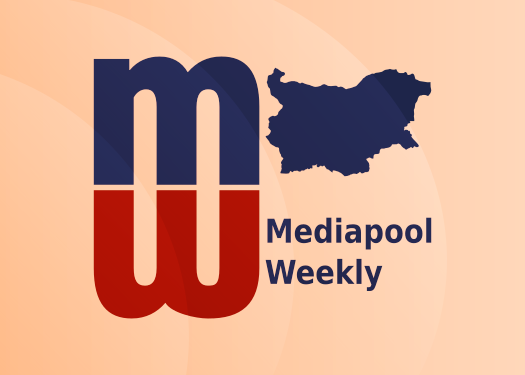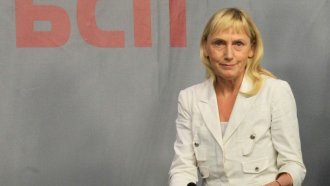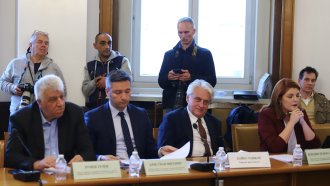Both Minority and Majority Voted Government to Stop Accepting More Migrants

With 177 votes MPs from across the political spectrum passed a resolution prohibiting the Council of Minister from signing any bilateral agreements that would lead migrants returning to the country. MPs also obligated the government to introduce to parliament a resolution on the joint EU position on migrants. Additionally, government must propose changes to the Dublin Regulation by September 30.
The Bulgarian Socialist Party insisted on parliamentary debates on the matter. The socialists introduced a resolution, very similar to the one Parliament ultimately passed. GERB had proposed an alternative resolution but PM Boyko Borissov eventually proposed for Parliament to conduct a joint resolution, for the purpose of which MPs took an hour recess.
The joint resolution was presented by BSP leader Kornelia Ninova and voted on unanimously. The leaders of the two largest opposing parties Ninova and Borissov exchanged courtesies and pleasantries upon the adoption of the resolution.
Parliament Passes Bill to Pardon 58 Million Leva Penalties for Domuschiev, Vice PM Valeri Simeonov Answers with Threats to Leave the Coalition
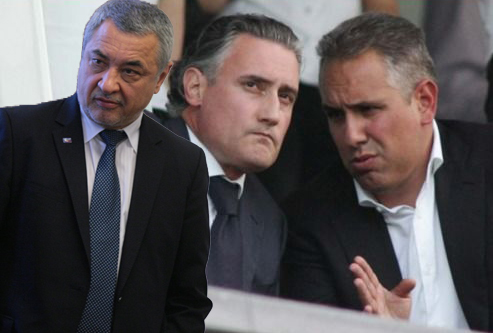
PM Valeri Simeonov and brothers Kiril and Georgi Domuschievi
On Wednesday Parliament passed a controversial bill, which would lead to the pardoning of potential 58 million leva worth of penalties, which the court ruled the brothers Kiril and Georgi Domuschievi to pay a mere week ago.
The Domuschiev brothers own the company KG Maritime Shipping, which privatized the Bulgarian national shipping company. The former lost the case in which it had requested amendments to the privatization contract between the company and the state for the denationalization the Navigation Maritime Bulgare. The changes the Domuschiev brothers’ company had requested concern lifting the requirement to maintain a certain tonnage of the ships. The Domuschiev brothers’ company have not been fulfilling this requirement of the privatization contract. As the company was standing to have to pay penalties, it submitted a request to the court to change the privatization contract accordingly. The court overruled the request. If the company does not provide the capacity as stated in the contract, it will have to pay 58 million leva in penalties.
Vice prime minister and leader of one of the parties within the ruling coalition Valeri Simeonov personally advocated for the state’s case against KG Maritime Shipping and has been very vocal about its importance. He was the one who officially announced the court’s ruling for the requirement for tonnage maintenance to remain and for KG Maritime Shipping to pay 58 million in penalties in case it does not fulfill the requirements by the end of the year.
Just as Vice PM Simeonov announced the ruling a win for the country, ATAKA MP Nikolay Aleksandrov and his colleague from VMRO Emil Dimitrov introduced a bill to Parliament, which provides for these penalties to be pardoned. Both NFSB and ATAKA are part of an inner parliamentary coalition of far-right parties, the United Patriots, which is a member of the ruling coalition. A day later Simeonov received backlash from ATAKA leader Volen Siderov. Siderov attacked him during a TV interview for leading battles against the “patriotic” businesses of Kiril Domuschiev, Valentin Zlatev and Vassil Bozhkov.
NFSB, the party of which Vice PM Valeri Simeonov is the leader of, condemned the “Domuschiev” bill as soon as it was voted on. NFSB MP Valentin Kasabov accused GERB of having sold the country for 58 million leva.
“This is the sum the Domuschievi brothers have to pay.”, he said and continued to asserting that GERB are scared: “And this fright comes mainly from Boyko Borissov”.
Kasabov also implied that the day before, during a meeting of the coalition partners, ATAKA had agreed to pull out the bill but GERB had rejected the idea.
Another worthy mention by MP Boris Yanchev was the observation that apart from NFSB no one objected the bill, most notably no one from the opposition, BSP, DBS or VOLYA.
Bulgaria: Eyes Wide Shut and Denunciation of Investigative Journalism
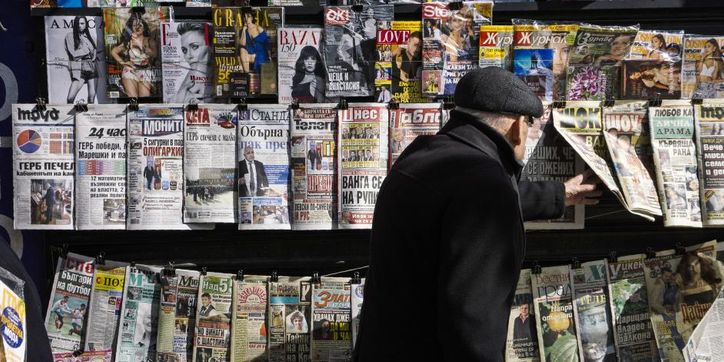
In a new report Reporters Without Borders provide a grim analysis of the state of Bulgarian investigative journalism. According to the report, there is investigative journalism in Bulgaria but their discoveries are met by a wall of silence and “eyes wide shut” by authorities. Furthermore, these journalists are being watched, bullied and demotivated via smear campaigns against them and called out as enemies of the state.
Just two months ago RWB published its annual World Press Freedom Index where Bulgaria had sunk to 111 place, last not only in the EU but also among the other Balkan countries.
The last report stated that “corruption and the constant complicity between media, politicians and oligarchs are prevalent. The most notable example of this abnormal situation is Delyan Peevski.”
The politician and media owner is named specifically in the new report as one of the main factors, along with the government, of the declining professional standards of journalism in Bulgaria.
The report is entitled “Mission Possible: Investigative Journalism in Bulgaria” and analyzes the reasons why less and less journalists embark on investigating corruption and other significant issues. “The classic reasons: corrupt editors and publishers, self-censorship, pressure from the government and the media ownership, which is concentrated in the hands of oligarchs, who use the press as media bats for realizing control and punishment of the few who resist”, the document states.
“Over the last year the concentration of media ownership has been astonishing: three fourths of the press is owned by the oligarch and legislator Delyan Peevski”, reads the report.
RWB notes that the press media close to Peevski have formed their own union, which withdrew from the Ethical Code of Bulgarian Media and adopted its own version of self-regulation. A citation from a 2016 report, entitled “Media Oligarchs Rejoice” where Delyan Peevski’s name is mentioned 18 times.
The report state that several media outlets, not associated with Delyan Peevski, continue to publish quality investigative journalism, and hold government persistently accountable. Amongthem are Capital Weekly, Sega Daily and the online Mediapool, ClubZ, OffNews and E-Vestnik.
The most recent report accounts for the following paradox: although journalism in Bulgaria as a whole, and especially investigative journalism is facing pressure and resistance from those in power, technically Bulgaria provides a good environment for investigative journalism. Bulgaria has many public registries, politicians and public officials are obliged to declare their ownership and conflict of interests, public procurement can be monitored online, and if that is not enough the Freedom of Information Act, which is thought to be one of the best transparency laws in Europe.
The financial obstacles facing independent journalism could be overcome: there are several Bulgarian and international foundations ready to support projects involving quality investigative journalism, the report notes. It goes on to conclude that investigative journalism in Bulgaria is not dead and even in a good state: journalists manage to bypass the wall of silence by sharing their findings on social media, where they snowball and government and mainstream media have no choice but to address the issues.
Radio Free Europe Will Resume Broadcasts in Bulgaria and Romania

Radio Free Europe announced on Thursday its plans to resume broadcasting services in Bulgaria and Romania in an effort to “strengthen the media environment in both countries”.
The president of the media Tomas Kent said he hopes RFE coverage, prepared by local reporters will “help the growth of free press, promote democratic values and institutions”.
RFE will begin broadcasting services in December of this year. RFE will publish multimedia coverage and analyses and plans to partner with local media outlets in debunking fake news and informing the public.
RFE returns to Bulgaria and Romania after it ceased broadcast in 2004 and 2008 respectively.
The Commission for Protection of Competition Blocks CEZ and NOVA TV Deals
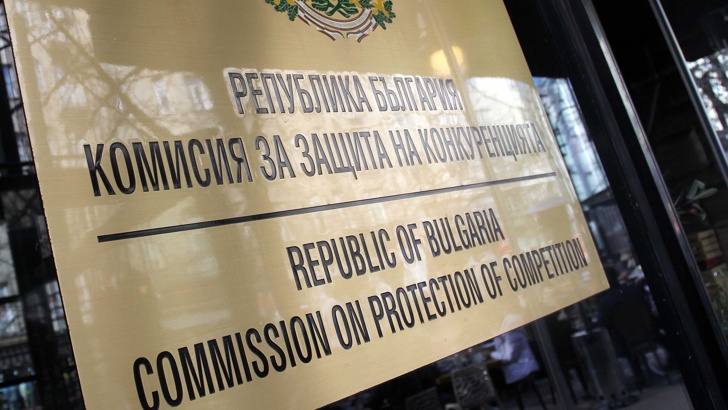
On the same day the Commission for Protection of Competition blocked two big deals: for the sale of one of three Bulgarian power distribution companies, CEZ to Ginka Varbakova’s Inercom, and the acquisition of NOVA Television and its associated media outlets and websites by the Czech mogul Peter Kelner.
The decision came as a surprise given the regulator’s common practice of not abstaining from intervening in such deals. Moreover, the commission makes its decisions based on the current size of the companies and market positions, not their potential for growth or power due to market concentration.
There is no apparent explanation for the commission’s actions at the time, except for acting as a favor to the government, which has been trying different ways to intercept the deal in vain. As for NOVA TV, reasoning can be found in the long standing suspicions that government is afraid of the control of the media to go to a foreign businessman from Kelner’s rank as there is a risk he would be too independent.
The formal reasons, provided by the anti-monopoly commission do not ring fully reasonable. In the case of CEZ, the commission asserts that the company already is part of the supply market, owning several photovoltaic parks, hence should not be part of the distribution chain. While that is true, Inecom’s photovoltaics account for 1.8% of the solar power on the market; after acquiring CEZ this market share would increase to 2,3%, which could hardly qualify as monopolizing the market. These calculations are not present in the commission’s decision but are easily deducible from public information.
It is worth noting that the commission had no objection to a prior similar deal for E.ON, in which case there were almost identical circumstances in terms of the buyer’s presence in the market.
As for the deal for Nova Broadcasting Group, the commission asserts ultimately that the company would have disproportional power in the market. The commission reasons that, as it has put it, the buyer’s “extensive experience and its different investment intentions are preconditions for the deal to lead to the establishment or strengthening of the [company’s] dominating position, which would restrict competition on the markets in question.”
Reactions from the affected sellers and buyers till now have been scarce. The would-be buyer of CEZ, Inercom, said it was “surprised”. The same reaction came from the seller of the NOVA Broadcasting Group (owner of NOVA TV). None of the four parties have yet examined in detail the commission’s resolution. Once they do, they will decide how to proceed. One option would be to give up on the deals, and the other – to attack the resolution in the Supreme Administrative Court.
One thing is certain: the commission’s decision will at the very least delay the change in ownership of both companies. In the case of CEZ, this will be one more damaging nail in a deal, which has been marked with heavy suspicions given the unknown and surprising candidate-buyer.
According to a Mediapool source the commission’s decision will provide Inercom with a way out of the deal, which it might be looking for after having much difficulties securing the funds needed to finalize the deal. If intercom pulls out because of the commission it will not lose the 5 million euro down payment it has made. Approval by the anti-monopoly body is a condition for finalizing the deal.
Democratic Bulgaria and the Bulgarian Industrial Capital Association Call on the President to Veto the Fuel Bill

The liberal non-parliamentary opposition party Democratic Bulgaria along with Bulgarian Industrial Capital Association (AIKB) called on President Roumen Radev to veto the bill for administrative regulation of economic activities related to oil and oil products.
Parliament passed the bill last week. The leading rationale the introducers of the bill made for it was that it is designed to reduce the gray sector. The procedures of debating, parliament healings, voting etc., however, were accompanied by protests by small and medium fuel dealers who claimed the law serves the interests of the largest franchise players on the market and most notably Lukoil, and will bankrupt them if it becomes a law.
The bill was passed with the votes of every parliamentary group except for the NFSB, which is is part of the ruling coalition. Its leader and vice prime minister, Valeri Simeonov attacked the bill repeatedly, calling it lobbyist and serving Lukoil.
The AIKB have sent a letter to President Radev, who still has a window to veto the bill become it officially becomes a law, to do so. The letter expresses AIKB’s members’ - branch organizations operating in various economic fields - frustration with the bill and its implications. If Radev vetoes the bill that would mean it will be returned for further readings, debate and voting in Parliament.
“The bill limits the fuel market only to the large dealers and provides real means for repressive measures against the other (small and medium) players on the market”, the letter reads.
Democratic Bulgaria insists also on a probe into the persons who introduced the bill for possible conflict of interests. The champion of the bill is Emil Dimitrov of VMRO, who also chairs the Parliamentary Committee for Countering Gray Economy. Valeri Simeonov repeated multiple times, in its argument that the bill is lobbyist, that Dimitrov is ‘close friends’ with Lukoil CEO Valentin Zlatev.
“Violating the lawful procedure for passing a legislative act and suspicions of conflict of interests on behalf of the lawmaker who introduced the bill, and refuses to name its author, reviews it within his own committee and obviously lobbies for it, are all grounds for the President to veto the bill, an investigation by the appropriate authorities and an involvement on behalf of the European Commission.”
AIKB and Democratic Bulgaria warned that if the bill becomes a law, this may lead to the EC opening a penal procedure against Bulgaria because of controversial VAT provisions in it.
President Roumen Radev has not yet commented the fuel bill at all.
Government Mitigates the Risk to Press Freedom Following Bulgarian GDPR Compliance

The anticipated amendments to the Personal Information Protection Act will undergo significant changes, after concluding that they pose a great risk to press freedom and the ability for journalists to do their job, in the form they were initially drafted.
Apparently the parliamentary committee in charge of the amendments has taken note of the growing criticism over the last weeks.
Some of the changes from the initial draft include dropping the requirement for journalists to receive consent to publish personal data, journalists will not be required to take down personal data from their material upon request from the person the data refers to, and photo journalists won’t be required to have consent of their subjects, journalists will not be required to reveal their sources to the Personal Data Protection Commission, upon request. The rules extend to academic, artistic and literature content. The new texts also discard the provisions, which put at risk the operation and existence of the public registries – a point which the Access to Information Program warned about.
The bill still conditions these provisions on the journalist carrying out their work in a way that does not violate the right to the protection of individual’ privacy.
Another criticism that the authors of the amendments have followed is the requirement for a Data Protection Officer to be appointed in companies controlling personal data of more than 10’000 individuals. This has also been dropped from the most recent draft, which would save a lot of costs especially for companies with websites that have registered users. The minimum fine of 10’000 for violations has also been abandoned.
The amendments to the Personal Information Protection Act aims to align Bulgarian legislation with the European GDPR which came into force in May.
New Case of Flight Bypassing Passport Control on Sofia Airport

Less than four months after the outrageous case, in which half the passengers from a Paris flight to Sofia entered the country without passport control, the Ministry of Interior has discovered it has allowed the same slipup, except this time – with a private jet flying from Gabrovo via Sofia to Greece.
The chief secretary of the law enforcement body, Mladen Marinov, admitted the mistake on Tuesday, but underlined that this time the fault is not his subordinates’ but the flight operator’s.
“Yes, there was such an instance, it was reported to me but the case does not fall under the jurisdiction of the border police… The operator of the flight failed to inform the authorities about the flight. Pre-trial proceedings have begun concerning the case… Again, this is not the border police’s mistake.”, Marinov said.
The Bulgarian border police have informed the Greek authorities in time about the situation and they have managed to check the five passengers upon arrival, and according to the chief of border police, Svetlan Kichkov “there was nothing suspicious about them.”
За честна и независима журналистика
Ще се радваме, ако ни подкрепите, за да може и занапред да разчитате на независима, професионална и честна информационно - аналитична медия.
 0 коментара
0 коментара
Екипът на Mediapool Ви уведомява, че администраторите на форума ще премахват всички мнения, съдържащи нецензурни квалификации, обиди на расова, етническа или верска основа.
Редакцията не носи отговорност за мненията, качени в Mediapool.bg от потребителите.
Коментирането под статии изисква потребителят да спазва правилата за участие във форумите на Mediapool.bg
Прочетете нашите правила за участие във форумите.
За да коментирате, трябва да влезете в профила си. Ако нямате профил, можете да се регистрирате.
